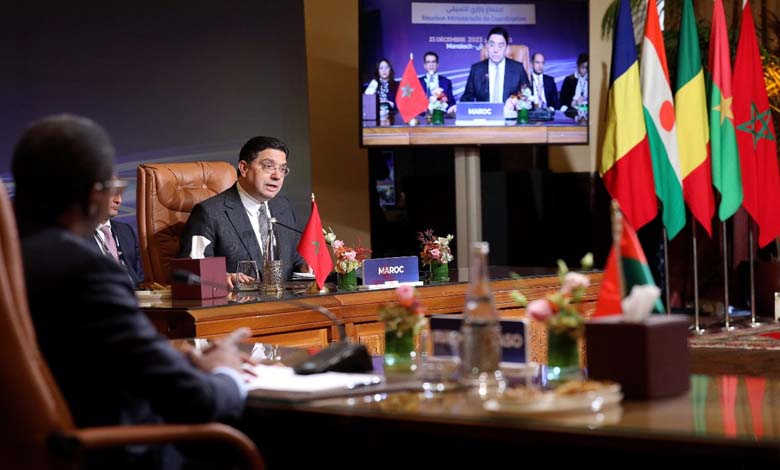Morocco’s Atlantic Project: A Lifeline from Crisis for Sahel Countries

Morocco is placing great importance on activating the Atlantic Access Initiative as part of its commitment to its African depth.
The Kingdom has proposed a massive project to provide the landlocked countries of the Sahel region with maritime access to the Atlantic Ocean through road networks spanning thousands of kilometers. This initiative represents an economic and political lifeline for these nations as they face growing challenges in a region rife with geopolitical instability and armed groups.
-
Commitment to the Atlantic Initiative Sets the Stage for Broader Cooperation between Morocco and Sahel Countries
-
The Atlantic initiative enhances Morocco’s chances in competition with Turkey and Iran
The project was announced in a 2023 speech by King Mohammed VI, stating: “We propose launching an international initiative aimed at enabling Sahel countries to access the Atlantic Ocean,” which borders the Moroccan Sahara coastline.
Through this initiative, Rabat aims to strengthen its influence in Africa while promoting development in the Moroccan Sahara, which is geographically closer to Sahel countries, at a time when Algeria’s relations with these nations are strained.
-
The Atlantic Initiative is attracting increasing international attention
-
Morocco begins Atlantic Initiative by reducing buffer zone with Mauritania
Morocco sees this project as part of its deep African commitment and aspires to act as a bridge between the two shores of the Atlantic, fostering collective responses to the shared challenges of African, and especially Atlantic, nations.
The proposal comes amid major shifts in Mali, Burkina Faso, and Niger—resource-rich countries now ruled by military regimes that seized power through coups between 2020 and 2023 and have turned to Russia after distancing themselves from France, their former colonial power.
These changes led the African Union and ECOWAS to take measures that increased the isolation of the three countries.
-
Algeria creates its isolation by punishing African countries joining the Atlantic initiative
-
The Atlantic Initiative Foils Polisario’s Bet on Instability Strengthening
Following an audience with King Mohammed VI in Rabat in late April, Niger’s Foreign Minister Bakary Yaou Sangaré said that Morocco was “one of the first countries to understand us at a time when ECOWAS and other nations were about to declare war on us.”
The three foreign ministers expressed their countries’ commitment to “accelerating” the project’s implementation. In September 2023, Mali, Burkina Faso, and Niger formed the Sahel States Alliance.
-
African countries discuss the implementation of the royal initiative for access to the Atlantic in Marrakech
-
Algerian move to disrupt the Morocco-Mauritania rapprochement
Currently, these nations depend on ports in ECOWAS countries (Benin, Togo, Senegal, Côte d’Ivoire, and Ghana), but their tense relations with this bloc could jeopardize access to those seaports.
They also face tension with Algeria to the north, having recalled their ambassadors in early April after accusing Algeria of downing a drone belonging to the Malian army in late March near the Algerian border.
-
A U.S. Bill Will Soon Designate the Polisario as a Terrorist Organization
-
Polisario Hints at Accepting Moroccan Sovereignty through Autonomy Initiative
Morocco’s diplomatic success has disrupted Algerian calculations, as the Atlantic linkage project has deepened Algeria’s regional isolation, especially amid its growing diplomatic rifts with several African nations, notably Mali.
In this context, Beatriz Meza, a researcher at the International University of Rabat, also highlights the “failure” of recent European operations in the region, such as Operation Barkhane. She argues that Morocco, forming a “strategic triangle” with Africa and the West, is “capitalizing on these setbacks by positioning itself as a reliable partner for both Europe and Africa.”
-
Efforts by the United States to Classify the Polisario Front as a “Terrorist Organization” – What’s the Story?
-
Tensions Rise in Tindouf Camps and Wave of Exodus from Polisario’s Grip
According to the Moroccan magazine Afrique en Mouvement, the United States, France, and Gulf countries are expected to contribute financially to the project, having officially expressed support for the initiative.
The project involves building road infrastructure connecting Chad, Niger, Mali, Burkina Faso, and Mauritania to Morocco. The total cost is estimated at around $1 billion, according to Abdelmalek Alaoui, president of the Moroccan Institute for Strategic Intelligence.
Chad, about 3,000 km away from Morocco, appears to be “less involved” compared to the trilateral alliance, says Sidiki Abba, president of the International Center for Sahel Studies and Thinking.
-
Morocco and the Gulf States Work to Strengthen Strategic Partnership
-
Larcher’s Visit to the Moroccan Sahara Reflects France’s Interest in Strengthening Cooperation with Rabat
He adds that “many stages remain before implementation,” as road and rail networks are currently lacking and the number of vehicles in the region is low. Nevertheless, Morocco is advancing with ambitious infrastructure plans.
Reda Lyammouri from the Policy Center for the New South says that a new road between Morocco and Mauritania is “nearing completion,” while Nouakchott is working to ensure the corridor continues on its territory.
-
With Weapons and Soldiers, the Russian Bear Strengthens Its Influence in the African Sahel
-
The Royal Momentum of the King of Morocco Leads to a New Achievement: Ghana Freezes its Recognition of the Polisario
However, the project heavily relies on security in the Sahel, warns Alaoui: “If skirmishes occur, your work halts by default,” as the region continues to suffer from recurrent jihadist attacks.
On the export-import side, the planned deep-water port “Dakhla Atlantique,” part of the Moroccan Sahara development strategy, will serve the initiative.
Launched in late 2021 with an estimated cost of €1.2 billion, this port, located in El Argoub at the heart of the region, is 38% complete and expected to be operational by 2028.
-
Morocco: The Most Qualified to Represent Africa at the Security Council
-
Algerian Interest in News of Mali’s Tuaregs Reflects Bias toward Separatists












